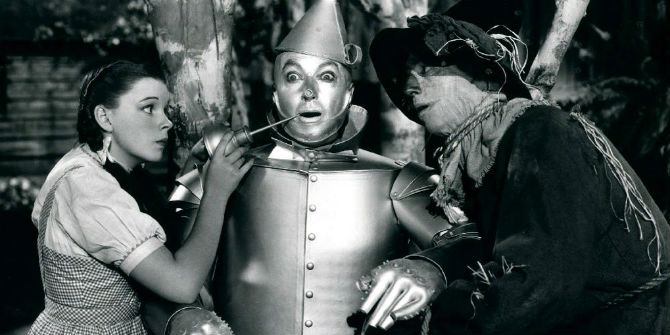 Is Brexit an opportunity for the left to respond to the ‘working class revolt’ among Britons, and reform capitalism for the better? Victoria Bateman argues that there are three categories of Leave voter, and each have very different motivations. It will be impossible to satisfy everyone’s wants. Expectations are high, and they will be disappointed.
Is Brexit an opportunity for the left to respond to the ‘working class revolt’ among Britons, and reform capitalism for the better? Victoria Bateman argues that there are three categories of Leave voter, and each have very different motivations. It will be impossible to satisfy everyone’s wants. Expectations are high, and they will be disappointed.
As the Leave campaign continues its celebrations, hope is rapidly turning into a new feeling of empowerment amongst some voters. Even Remain supporters have found a silver lining. Throughout newspapers and in numerous blogs, they talk of how the Leave victory has provided a much needed wake-up call, one which will transform British – and perhaps European – politics for the better.

After years of rising inequality and seething social resentment, something which dates back to Thatcher’s 1980s era of deindustrialisation and free market reforms, the “bubble” in which metropolitan elites supposedly reside has now been well and truly burst. The “losers” of globalisation have come to the fore in what Owen Jones of the Guardian has called a full scale “working class revolt”. The future on offer, if only we choose to take it, is, conciliatory: one of a kinder and more caring capitalism, one of social unity. In other words, Brexit might just have saved us from a much bigger political revolution – of a more Marxist form – further down the road, pushing us to reform capitalism for the better.
Despite the economic turmoil, and as the dust settles, it seems that hopes are therefore being raised on both sides. There is, however, a problem: raised expectations can be difficult to meet. So, the real question for politicians is what happens when these expectations are, at some point in the future, met with reality? Will they be met, or will they be dashed? If it’s the latter, the legacy of Brexit will not be social unity, as is currently predicted, but widespread social disillusionment. And the more that hopes are raised over the coming months, the greater that disillusionment will be.
Of course, some might say that expectations are already tempered by bleak reality. The tumble in the stock market and decline in the pound provide an early signal that the warnings of economists and business leaders were not, as the Leave campaign chose to spin them, “Project Fear”. However, this pessimism is, for the time being, proving easy to quell. The front page of the Daily Telegraph began the week with Johnson’s call to be “proud and positive”, saying: “At home and abroad, the negative consequences are being wildly overdone, and the upside is being ignored”. Gerard Lyons, the economic advisor close to Johnson, wrote in the Sunday Times that we are experiencing “a bump, yes – but then watch us surge ahead with new friends”.
Hence, no matter how bad things become over the next few days, weeks or months, the electorate will be spun a story in which there is “no gain without pain”. When they say “I told you so”, Remain voters will be ignored. Leave voters will instead be told that all they have to do is to wait for their amicable European divorce. Then the promised land will follow.
What that promised land involves is, of course, still to be determined. Here, we regularly hear that the problem is straightforward: that the Brexiteers have no strategy, and need to adopt one pretty quickly before invoking Article 50. I would instead say the opposite: there are three very clear strategies. The problem is that they are at opposite ends of the spectrum. That makes social disillusionment – rather than social unity – the future of Britain.
That’s because, rather than being a homogenous group of working class globalisation “losers” of the kind that commentators seem to have in mind, Leave voters could not in fact be a more motley crew.
Yes, there are those with real and pressing concerns about inequality, jobs and public services, for whom reforming capitalism would be the best way ahead. But there are also Leave voters who have no such complaint: they have voted for nationalistic reasons, and with an uncompromising desire to reduce immigration. As Lord Ashcroft’s polls have revealed, the average Leave supporter is not, unlike left-leaning liberals, a fan of anything particularly progressive: from the internet to feminism and environmentalism (see chart below), they take issue with almost every forward-looking aspect of societal change. In fact, capitalism seems to be the one thing that least – not most – divides referendum voters, consistent with the clear but largely unspoken fact that majority Brexit neighbourhoods include prosperous Southern as well as poorer post-industrial Northern counties. According to Eric Kaufmann, Professor of Politics and writer for the Fabian Society, it is wrong to characterise Leave supporters as “the left behind”.
Source: Lord Ashcroft polls
Then there is a third quite different category of Brexiteer: the followers of Boris Johnson and thinkers such as Andrew Lilico. These are the people who see leaving the EU as an opportunity to carve out a new more internationalist and more market-oriented – less state interventionist – Britain. This isn’t quite the future that either the first or the second kind of Brexiteer had in mind. Yes, people have voted to “take control”. They just don’t agree on how control should be exerted.
Trying to please the 52% of the British public that have voted Leave when the campaign seems to have promised all things to all people will be near impossible. If only Leave really were a homogenous group of globalisation “losers”, as many commentators seem to believe, there might indeed be an opportunity for jam tomorrow, to unite society and reform capitalism, allowing us to take a silver lining from what is a rather big cloud.
However, given the divisions within the leave camp, the promised land is likely to be one of either significant compromise – one that suits no one and is in fact inferior to Britain’s previous arrangements with the EU – or one which, as with Lilico’s solution, keeps some people happy whilst seriously off-siding others. If that’s the case, then rather than coming together, it’s just as likely that British society could break apart in a sea of disillusionment. Either way, there will be plenty of pain with very little gain.
At the end of the day, and whether they be Leave supporters or the left-leaning segment of the Remain camp, the majority of the British population are about to set off on a long and arduous two year journey along the Yellow Brick Road, heading for Oz, facing a period of pain and uncertainty that only Dorothy can sympathise with and, that they believe, will bring them to a place that will make all of that pain worth it. When they instead reach the Emerald City and find nothing more than a little man behind a curtain with a loudspeaker, pretending to be something he is not, the question is this: how will they react? After two years of a divergence between reality and expectations, where will Britain end up and what condition will democracy find itself in?
That’s the real challenge for the future, and one that is, unfortunately, unlikely to bring about unity.
This post represents the views of the author and not those of the BrexitVote blog, nor the LSE.
Victoria Bateman is a College Lecturer and Fellow in Economics at Gonville and Caius College, University of Cambridge.








A most informative and well-crafted analysis of the present situation. It clearly demonstrates the Leave Campaign’s cynicism and manipulation of the most vulnerable sections of British Society.It is a depressing inditement of our education system that so many people are unable to ask or answer more than one question of themselves or of those they look to for advice or information.
I fear greatly for the future of not just the remnants of the UK but for Europe itself. It’s failure to recognise let alone address the fears and anxieties of huge swathes of its population do not bode well.
Correction sp error indictment
If only it could turn out to be a dream, as in the Wizard of Oz, with the realisation that the yellow brick road’s promise of “sunny uplands” is an illusion and the lesson learned is; “there’s no place like home” i.e. where we were in the first place – in the EU – with a deeper understanding, appreciation and new perspective. Donald Tusk’s “hard brexit or no brexit” speech suggests this is a possibility.